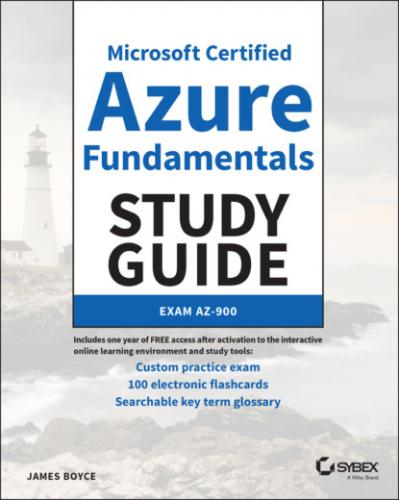AZ‐900 Exam Objectives
Microsoft Certified Azure Fundamentals Study Guide: Exam AZ‐900 has been written to cover every exam objective at a level appropriate to its exam weighting. The following table provides a breakdown of this book's exam coverage, showing you the weight of each section and the chapter where each objective or subobjective is covered:
| Subject Area | % of Exam |
| Describe cloud concepts | 20–25% |
| Describe core Azure services | 15–20% |
| Describe core solutions and management tools on Azure | 10–15% |
| Describe general security and network security features | 10–15% |
| Describe identity, governance, privacy, and compliance features | 20–25% |
| Describe Azure cost management and service level agreements | 10–15% |
| Total | 100% |
Domain 1: Describe Cloud Concepts
Subdomain 1a: Identify the benefits and considerations of using cloud services
| Exam Objective | Chapter |
| 1‐1 Identify the benefits of cloud computing, such as High Availability, Scalability, Elasticity, Agility, and Disaster Recovery | 1 |
| 1‐2 Identify the differences between Capital Expenditure (CapEx) and Operational Expenditure (OpEx) | 1 |
| 1‐3 Describe the consumption‐based model | 1 |
Subdomain 1b: Describe the differences between categories of cloud services
| Exam Objective | Chapter |
| 1‐4 Describe the shared responsibility model | 1 |
| 1‐5 Describe Infrastructure‐as‐a‐Service (IaaS) | 1 |
| 1‐6 Describe Platform‐as‐a‐Service (PaaS) | 1 |
| 1‐7 Describe serverless computing | 1 |
| 1‐8 Describe Software‐as‐a‐Service (SaaS) | 1 |
| 1‐9 Identify a service type based on a use case | 1 |
Subdomain 1c: Describe the differences between types of cloud computing
| Exam Objective | Chapter |
| 1‐10 Define cloud computing | 1 |
| 1‐11 Describe Public cloud | 1 |
| 1‐12 Describe Private cloud | 1 |
| 1‐13 Describe Hybrid cloud | 1 |
| 1‐14 Compare and contrast the three types of cloud computing | 1 |
Domain 2: Describe Core Azure Services
Subdomain 2a: Describe the core Azure architectural components
| Exam Objective | Chapter |
| 2‐1 Describe the benefits and usage of Regions and Region Pairs | 2 |
| 2‐2 Describe the benefits and usage of Availability Zones | 2 |
| 2‐3 Describe the benefits and usage of Resource Groups | 2 |
| 2‐4 Describe the benefits and usage of Subscriptions | 2 |
| 2‐5 Describe the benefits and usage of Management Groups | 2 |
| 2‐6 Describe the benefits and usage of Azure Resource Manager | 2 |
| 2‐7 Explain Azure resources | 2 |
